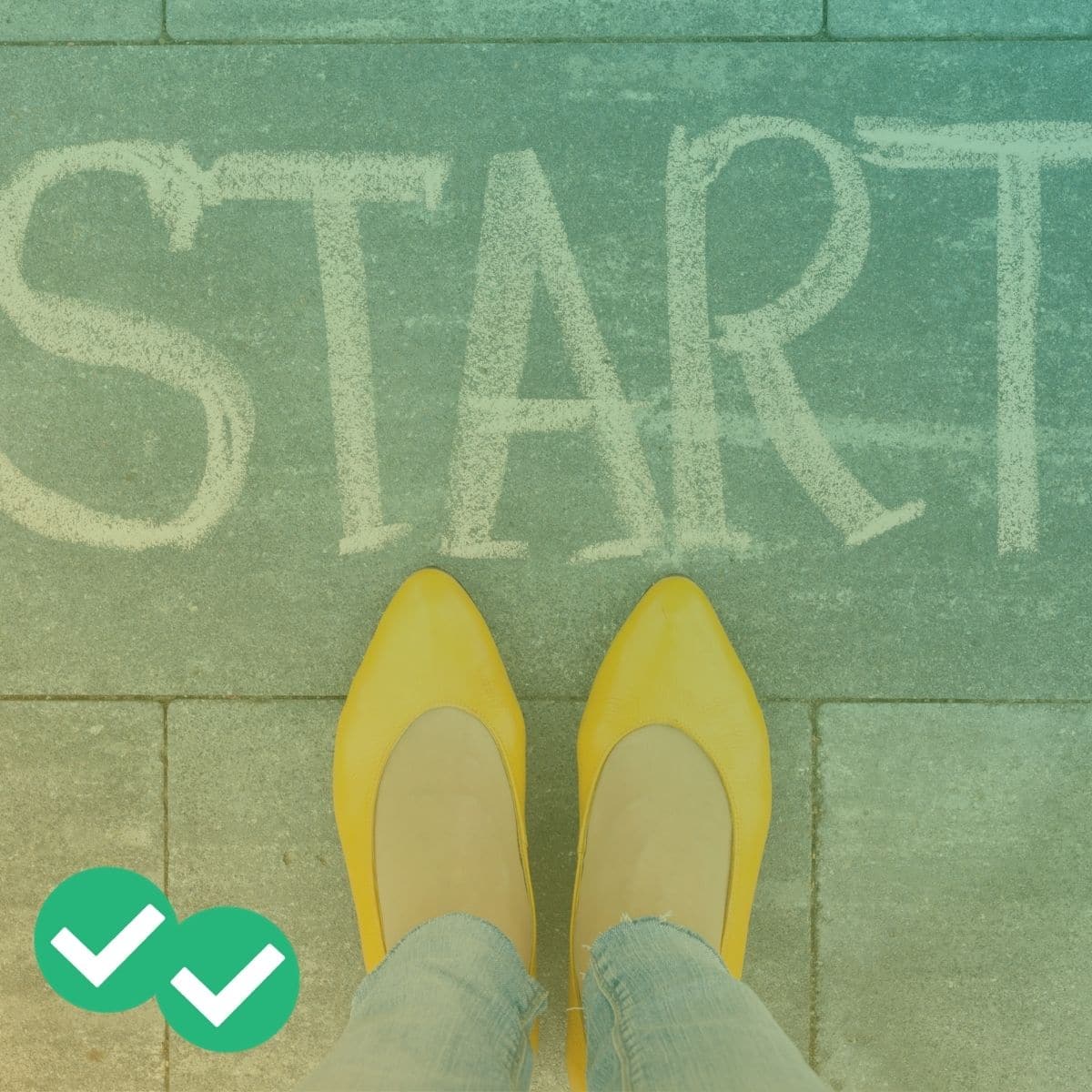
Determining how to study for the GRE can be a daunting task, especially if you’re juggling a full-time job or a heavy class load. Given limited free time, you may be wondering if it’s even possible.
Don’t worry: it is possible—even with a busy schedule! How to best study for the GRE really boils down to four key steps:
- Get Oriented: Know the Test and Set Your Targets
- Plan Your Attack: Build a Study Strategy
- Practice with Purpose: Learn, Review, Repeat
- Keep Going: Stay Consistent and Confident
We’ll look at each of those in depth so that you can prep for the GRE efficiently and effectively. Additionally, we’ve included advice from students just like you who have done exactly that. Follow their example so that you, too, can achieve the score you need for the GRE.
1. How to Study for the GRE with a Score Goal
First and foremost, you have to know what target you’re aiming for. Needing a 310 on the GRE (which is a little above average) is very different from needing a 330 (which would put you over the 90th percentile).
So, what’s a good GRE score out of 340? It really depends on the specific schools that you’re applying to, as well as your field of study. Be sure to research your programs to learn what minimum scores they require.
In general, a GRE score of 320 is considered a good target. That puts you near the 75th percentile of GRE test takers. But if your school only requires a 305, trying to get a 320 would involve way more studying than you need to do!
Additionally, make sure you research which sections—Quant, Verbal, or Writing—your schools care most about. Some programs place much more emphasis on math over verbal, for example.
See how this student set a specific section goal to make the most of her time
“I needed to increase my quant score by at least 8 points for my grad program of choice, so I hammered math like there was no tomorrow. I watched every lesson video and completed over 400 math problems, and I gained 11 points in quant! My verbal score didn’t improve at all, but that’s to be expected because I spent no time studying for it.” — Christina
💡With quant improvement as her sole goal, she didn’t waste any time studying for something that didn’t impact her application.
2. Take a Practice Test to Establish Your Baseline Score
After you discover your target score, you next want to see how far away you are from that score. If you’ve already taken the GRE, use that data point. But if not, a great place to start is by taking a free GRE practice test.
After you have your current score, subtract that from your target total score to see how many points you need to gain. And, again, depending on your school of choice, those points may need to come from just the math section or just the verbal section (or a combination of the two).
Note that the GRE’s essay—the Analytical Writing section—doesn’t factor into your total score but is instead graded separately on a 6-point scale, in half-point increments.
For many programs, this is more of a checkbox requirement, so getting an average score of 4 will suffice. However, depending on your field of study, this section may have added importance for you (or present you with an opportunity to stand out from the crowd!). If that’s the case, be sure to budget more time into your studies to specifically focus on improving your essay skills.
❗Brand new to the GRE? Before taking a practice test, we recommend that you learn about the structure of the test and the types of questions it asks. The GRE has some unique question types that may catch you off guard if you’ve never seen them before.
3. A Realistic Goal Goes a Long Way in Knowing How to Study for the GRE
What’s a realistic goal for score improvement on the GRE? Another way to phrase that question is: how much time and effort can you reasonably spend on studying for the GRE?
Time is almost always the determining factor. Could you spend many hundreds of hours studying for the GRE and move from a 290 to a 330? Possibly. But most don’t have that kind of time, so a 40-point increase isn’t a reasonable goal.
Unfortunately, there’s no magic equation where X hours of studying guarantees anyone an increase of Y points. There are all kinds of factors involved in estimating how long it would take an individual to improve their GRE score, and even then, it’s highly variable.
Dream Big But Have Stepping-Stone Goals
That’s not to say that you can’t dream big! You can certainly aim for the stars. However, set smaller goals first, see how things go, and reassess along the way. Aim for a 5-point improvement first, see how much time that takes you, and then use that experience to gauge how much time will be needed for further improvement.
Just keep in mind that the further you move up the total score scale, the harder and more time consuming it becomes to earn points. Early on, you can improve quickly by learning about question types, test strategies, and foundational concepts. Beyond that, you’ll have to dive even deeper into concepts, do much more practice, and emphasize avoiding mistakes.
See how this student set a small goal—and then surpassed it
“I am a non-traditional student (almost 40!), and it had been nearly 20 years since I had used a lot of the required math skills on the GRE. Mike McGarry was a wonderful instructor, really teaching you the why behind the various concepts, and helping to develop your number sense, which I found hugely useful. I bumped my math score nearly 20 points from my first practice test to the actual GRE. I had an overall score of 331, which was well beyond my goal of 320.” — Carey
4. Pick a GRE Study Schedule
One of the best ways to get started and to stay on track in your studies is to follow a study schedule. A consistent theme among our students is that those who follow a schedule see greater improvement. Even ETS, the makers of the GRE, have an article on study advice entitled It’s Better When You Have a Plan.
A good study schedule takes the guesswork out of deciding what to do on a given day, allowing you to jump right in with the limited time that you have. Furthermore, it gives you actionable tasks that help you gauge the progress you’re making towards your ultimate goal.
On Magoosh, there are a couple different study schedule options built right into your dashboard. You can also find a full list of schedules on our blog. These schedules are designed for different timelines and different needs and can also be adapted as you see fit. Check out this video from Chris for a full overview.
See how this student was rewarded for sticking with a schedule
“I went from not even knowing what the GRE was to getting a great score in two months. I followed the 3 month study plan and felt that Magoosh prepared me so well that I took my GRE a month early and only completed 2 of the study plan months. I got a 323 total, and was so happy with my score I cried. I came into GRE studying so nervous, clueless and unprepared and came out with an amazing score I couldn’t be happier with.” — Grace
5. How to Study for the GRE with a Busy Life
Picking and following a study schedule is important. However, it’s equally important to choose one that appropriately fits into your life. Trying to do 8 hours of studying a week when you only have 4 won’t feel good and will lead to more stress and frustration than improvement.
In the case of something like the above, consider spacing out your studies more. For example, if a one-month schedule is too much, take two days for every one day on the schedule. Now you have a two-month schedule that’s much more doable and sustainable for you.
But what if you only have a single month to study? It’s still not worth it to try to study more than you can handle. In fact, consistency is much more important than cramming. Regular, focused study sessions—even if they’re short—can lead to significant improvements over time.
So, you may not be able to do each task every day on your schedule, and that’s completely okay! Your schedule may end up looking more like this, which will be more effective for you:
- Only 15 minutes available on Monday? = I’ll study vocabulary with flashcards.
- 30 minutes on Wednesday = I’ll do a full math section.
- 20 minutes on Friday = I’ll review the questions I got wrong on my practice session.
- 1 hour on Saturday = I have more time so I’ll watch a few lessons and then do some additional practice.
See how this student made the most of her limited time
“I graduated from university in 2008, high school in 2005. So it has been a long time since I had to know algebra, geometry, etc. I only had a short time to study (4 weeks) plus working full time at a new job, and taking care of my family/house. Magoosh came up with a great study schedule that helped me maximize my time to focus on where I could make the biggest improvements in the shortest time.” — Michelle
6. How to Best Study for the GRE? Practice and Review
There’s no avoiding it: to see improvement, you’ll have to practice. But just as crucial—if not more so—is reviewing your practice. To make the biggest strides, you need to identify why you answered a question incorrectly.
In fact, we highly recommend that you keep an error log to track exactly that. The better you pinpoint the cause of your mistake—a lack of understanding fundamental concepts, not being able to decipher what the question is asking, running out of time, etc.—the better you know what specifically to focus on.
❗Blitzing through practice questions won’t lead to much improvement. Taking the time to analyze your mistakes and refine your approaches is a better use of your time. Learn more about how to make the most out of your lessons and practice.
7. Target Weaknesses
As you practice and review, you’ll gain a better understanding of your strengths and weaknesses. Strengths are areas that you’ll still want to practice occasionally to stay sharp, but ultimately they won’t require much of your attention.
The biggest boosts to your GRE score will come from targeting your weaknesses. Whether that’s through advancing your understanding of concepts or doing additional practice (or both!), those weak areas are where you’ll want to spend the most time.
One essential thing to do is to break big problems into smaller patterns. Instead of thinking, “I’m bad at reading,” drill deeper and figure out:
- Do I struggle with inference vs. main idea questions?
- Do long passages drain my energy?
- Is vocab slowing me down?
The more precise you can be in your analysis, the more precise you can be in your practice.
See how this student scored over 330 by prioritizing their weakest area: vocabulary
Utkarsh: Before I started my preparation, my English was abysmal. My vocab was wanting and I could not really understand sentences with heavy words. Magoosh’s free vocab ebook + Chris Lele’s Vocab Workbook proved to be a panacea for all my inadequacies. I religiously studied those books and found them more than sufficient for my GRE prep.
Special mention to:
8. Build up Pace and Stamina for Test Day
Though targeting weaknesses is a great way to pick up points on the exam, be sure not to forget about the exam as a whole. Doing focused practice sets is helpful, but test day ultimately involves a random mix of question types and topics. Therefore, it’s essential to practice in that manner as well.
In other words, you’ll want to tackle multiple full-length practice tests during your studies. The entire test is almost two hours long—with no breaks between any sections—and that requires a fair amount of stamina. Furthermore, you’ll want to have your pacing strategies ingrained so that they’re automatic. Test day may through a curveball question at you. But you’ll be prepared to make your best attempt, guess, and then return later if you have time.
You’ll also want to be familiar with the GRE’s interface. Get comfortable with bookmarking and skipping questions and using the overview page to jump to a specific question. And, for math, practice with the built-in calculator to ensure that you can quickly and accurately use it if you need to.
💡 Test-day stress is real, but practicing under test-like conditions ahead of time goes a long way in making it more manageable.
9. Stay Motivated
There will be ups and downs in your studies and highs and lows on your practice tests. It’s all part of the process, but it can be hard to stay motivated. As mentioned earlier, consistency in your studies is what really pays off, even if you’re just doing a little bit at a time.
Having a study schedule to follow helps a lot. But it’s also encouraging to know that you’re not alone. Many students like you have persevered and found success, so let their stories spur you on:
10. Quick Tips for How to Study for the GRE Efficiently
When studying, remember that quality is better than quantity. Here are some ideas to maximize the results you get from your study times:
- Develop a daily routine. Perhaps the first thing you do each morning is a verbal practice set. Or maybe during each lunch break, you run through a deck of flashcards. Or if you’re instead a night owl, you set aside 30 minutes each evening to watch some math lessons after everyone else has gone to bed.
- Save time by watching videos at double speed or by skimming their transcripts instead.
- Intentionally don’t study uncommon topics—like probability—so that you can focus on higher priority topics like Algebra.
- Set small, achievable goals, and reward yourself for reaching them.
- Avoid burnout by taking regular breaks.
- Use the Pomodoro technique to stay focused.
Ultimately, experiment to see what you prefer and then study in the way that works best for you.
See how this student found success studying in the way best suited for her
“I am a nurse, and I was working full time. I had been out of school for several years and it had been even more years since the last time I took a math class. I didn’t have time to pore over multiple books and resources.
Magoosh boiled down concepts for me so I didn’t have to waste time looking at different resources. I could skip concepts I felt comfortable with already and the video transcripts appealed to my learning style (I like to read as opposed to listen). I was able to do flash cards on the Magoosh app while I was traveling or had down time at work.” — Kayleigh
Closing Thoughts
We hope these tips and strategies—along with comments from students like you—empower you on your journey to success. For all the lessons and practice you need for GRE prep, check out a Magoosh GRE Premium plan to best stay on track. Happy studying! =)





